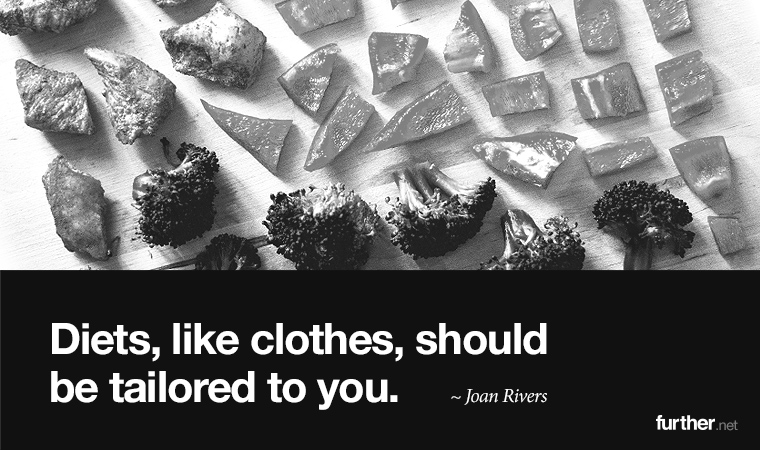
further: feature
If you want to lose weight, controlling what you eat is much more effective than exercise. So it’s no wonder that at any given time, at least one in five American adults is on a diet.
And yet, research featured in this month’s cover story for Scientific American Mind reveals that most people not only can’t keep the weight off, they often end up weighing more. That’s because the way dieting works is really hard psychologically, and therefore sets us up to fail.
Here’s a quick summary of what the article reveals:
What the Hell?
Psychological studies show that diets cause mental fatigue, create cravings for unhealthy food, and set the stage for binge eating when we fail to live up to the restrictive parameters we set for ourselves. This last outcome is called the “What the hell” effect, although you may have your own version.
Essentially, you end up cheating on your diet. Instead of simply striving to do better next time, we tell ourselves “What the hell,” and scarf a pint of mint chocolate chip ice cream (and by we I mean me).
Depriving yourself of your favorite foods, counting calories, and eliminating entire food groups that you’re used to eating adds up to an unsustainable situation. The right idea is to slowly modify what you eat over time until it’s not some huge psychological trial by fire.
Check Your Head
The first step before doing anything is to change the way you think. In an ironic twist of fate, people who feel better about their bodies to start with have an easier time losing weight than those with negative body images – so give yourself a break.
Then it’s time to think in terms of process, not results. You’ll be much happier if your goal is eat better in order to train for your first 5K, or to perform better in pick-up basketball games, than focusing on “I need to lose 20 pounds.”
Slow and Steady
When it’s time to alter the way you eat, the best approach is the same as with building other new habits – incremental change. This is a change in diet, rather than a “diet,” because it allows you to adapt slowly without the intense effort and restrictive denial that most “diets” require.
A 2008 study showed that overweight and obese adults who made modest incremental changes lost four times more weight than those who attempted more extreme plans. A more recent 2015 study verified that this approach also works for those who want to lose smaller amounts of weight.
Now … Hit the Gym
Without changing what you’re feeding your body, exercise alone is shockingly bad at leading to weight loss. But once you’ve taken a sufficient amount of baby steps toward eating better and reducing caloric intake, exercise accelerates the magic (among many other benefits).
Weight is lost in the kitchen, but health is achieved at the gym (or the trail, street, or pool). Just put it in its proper place so you don’t overload your willpower too early on.
Change is Hard (But Not Impossible)
We know we can change and grow … but it helps to be realistic about it. Even “extreme athletes” start small. Diet is no exception, and in many cases our eating habits are some of the hardest to change, because certain foods are so pleasurable.
Eat a tiny bit better each day, and you’ll be amazed at how your diet looks in three months. Not to mention how you’ll look in the mirror.
further: health
Fishy Supplements
“Omega-3 fatty acids and antioxidants are often marketed to promote brain health. But one study to test these supplements has found no evidence that the pills stave off cognitive decline in older people.”
Supplements Don’t Fight Cognitive Decline, N.I.H. Study Says
further: wealth
Let Passion Follow You
“What we’ve found is that the best predictors of job satisfaction are features of the job itself, rather than matters of pre-existing passion. Research shows that what you should be looking for is work that is engaging: find that, and you’re likely to develop long-lasting passion for that work.”
The Many, Many Problems With “Follow Your Passion”
further: wisdom
Cue the “I’ll Read That Later” Comments
“Procrastination is the biggest hurdle to managing your time and meeting your goals, yet many of us succumb to the temptations to push tasks aside, and check our social media feeds one more time, or grab that fourth cup of coffee. The next time you feel the urge to procrastinate, try these techniques to finally get things done.”
How to Push Through Procrastination
__________
If you’re in the US, I hope you had an enjoyable Labor Day Weekend. Further is one day late because I didn’t want to set a bad example. 🙂
Keep going-
Brian Clark
Tour Guide
Further
